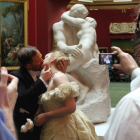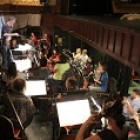Traviata 2013Edinburgh Grand Opera
Read more about the opera Traviata
It was hardly surprising that in his bicentenary year Edinburgh Grand should choose Verdi for their main stage production. Given the availability of appropriate singers, La traviata is likely to be a clear first choice in popularity. The company also made a welcome return to the attractively refurbished King's Theatre. As with last year's Carmen, the original language was chosen, and a remarkably high standard of diction was maintained by all participants. While it may nowadays seem odd to be deprived of surtitles, the choice was justified by the meaningful use of words throughout, and, of course, it also permitted a late replacement to come in who would not have known an English text.
There are never enough opportunities for opera singers in Scotland and Edinburgh Grand Opera are to be congratulated on their efforts. Since 1955, they have been bringing us high quality musical performances in remarkably effective productions. On this occasion, the set could hardly have been simpler - just a few draperies - but the overall stage pictures worked very well, with effective use of lighting and of period costumes, also of a chorus that was able to create individual characters rather than just standing around. Conductor Richard Lewis has previously shown his flair for the pacing of Verdi - generally on the brisk side but flexible - the excellent orchestra gave a very good account of the score.
The cast on opening night came across very well. Violetta is renowned as a fiendishly difficult role, requiring several styles of technique in one evening, apart from the powerfully emotional acting. Rachael Brimley passed the test with flying colours. Her only slight vocal weakness came, as with many interpreters of the part, in the first act, where her coloratura was perhaps too hard-edged. After that she settled to give a broadly-phrased and sweet-toned account of the part. Her acting throughout was effective and moving.
The tenor scheduled for Alfredo in the first and third performances fell ill during rehearsals, and the company was lucky to recruit Oscar de la Torre, a Mexican based in Munich. His career so far has shown a bias towards Rossini and the bel canto school, but his voice is an attractive one, now gaining in power, while still retaining flexibility and an easy top. Like his Violetta, he was prepared to sing quietly and expressively when the opportunity arose - very effective in this theatre.
The veteran baritone Ivor Klayman was ideally suited to Germont, phrasing his arias beautifully. Perhaps the possession of a walking stick or cane - even a hat to hold - would enhance his arm movements. Promising young singers filled the smaller roles - and the party animals, Marquis, Baron, Doctor, so often indistinguishable in evening dress, were all well-differentiated characters.
Performance Cast
- Violetta Valéry a courtesan
-
Rachael Brimley (May 8, 10)
Susan McNaught (May 9, 11)
- Baron Douphol Violetta's protector, a rival of Alfredo
- Doctor Grenvil
- Flora Bervoix Violetta's friend
-
Taylor Wilson (May 8, 10)
Debora Ruiz-Kordova (May 9, 11)
- Marquis d' Obigny
-
Richard Mein (May 8, 9, 10)
Ian Paterson 2 (May 11)
- Gaston Vicomte de Letorières, a man about town
- Alfredo Germont Gaston's friend
-
Oscar de la Torre (May 8, 10)
Ralph Strehle (May 9, 11)
- Annina Violetta's maid
-
Sarah Buckley (May 8, 10)
Angela Estrada (May 9, 11)
- Giuseppe Violetta's servant
- Giorgio Germont Alfredo's father
-
Ivor Klayman (May 8, 10)
Rhys Jenkins (May 9, 11)
- Commissar in Flora's household
- Messenger
- Dancer







